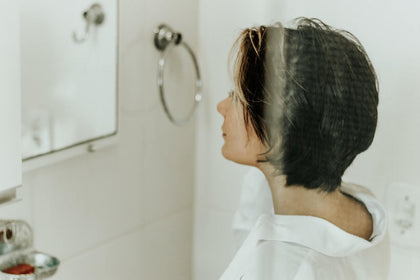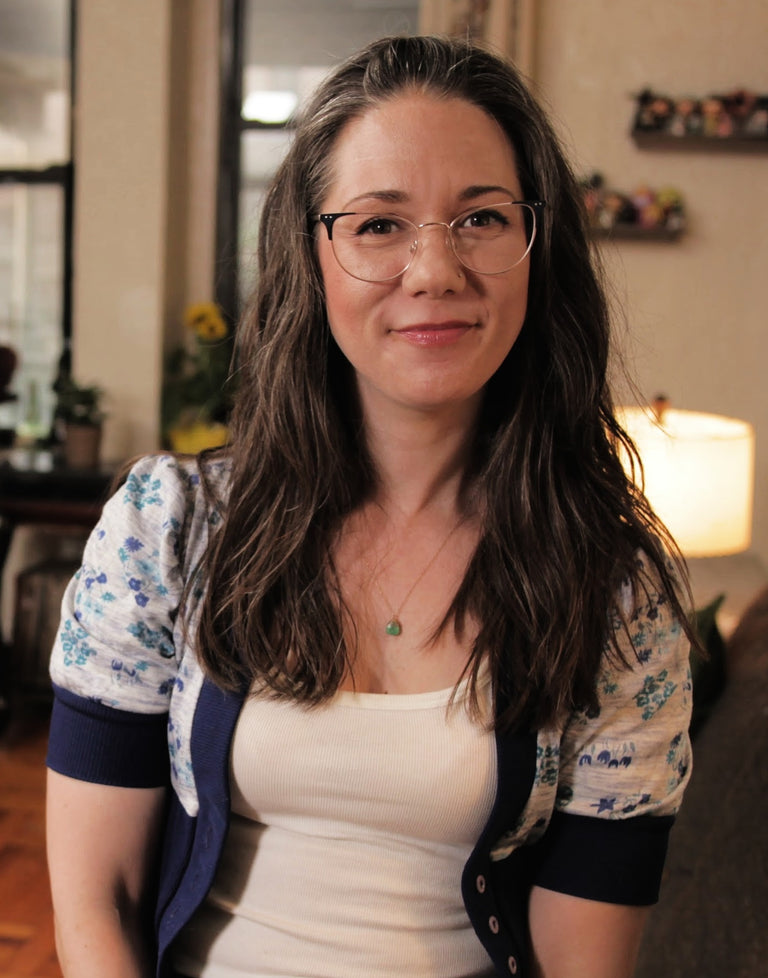We all want our hair to look good. Hair health is often inextricably linked to our overall sense of identity, attractiveness and self-worth, which is why hair loss can be so devastating. If you’re experiencing distress around hair loss, you’re definitely not alone.
Read on to better understand the psychological impacts of hair loss, and find out what products you can use to encourage thicker, fuller, healthier looking hair.
What Is Hair Loss and Why Does It Happen?
Hair loss is very common. In fact, roughly half of men and women will experience some thinning or loss by age 50. Hair loss is also complex and can happen for a variety of reasons and in a variety of ways. Genetic and environmental influences, health conditions and stressful life events can all bring about hair changes.
Hair loss is generally broken down into scarring versus non-scarring.
Scarring Hair Loss
With scarring hair loss (also called scarring alopecia), follicles are damaged, and hair loss is generally permanent. Scarring hair loss can be caused by conditions such as frontal fibrosing alopecia, central centrifugal cicatricial alopecia, or discoid lupus erythematosus, for example.
Non-Scarring Hair Loss
Non-scarring hair loss does not cause permanent damage to hair follicles, and hair regrowth may be possible depending on the underlying cause. Common forms of non-scarring hair loss may be caused by telogen effluvium, hair styling practices, androgenetic alopecia, thyroid issues, autoimmune disorder and hormonal changes, among others.d
Focal vs. Diffuse Hair Loss
Hair loss may be focal, which means it is concentrated in one area. A common form of focal hair loss is the patchy bald patches associated with alopecia areata, for example. Hair loss can also be diffuse, meaning it is spread evenly over the head or body. Common forms of diffuse hair loss are associated with telogen effluvium, alopecia totalis and alopecia universalis, for example.
Find Your Perfect Hair Wellness Routine: Take the VEGAMOUR Quiz
Can Hair Loss Cause Depression?
Hair loss can impact mental health and wellness in a variety of different ways, including depression. We live in a world that prizes physical looks, and a healthy head of hair is one aspect of physical appearance that people devote a fair amount of time, energy and resources toward.
“Though each of us enters the world with varying presentation of hair, as a culture, hair has become a large area of focus,” said Dr. Cynthia Shaw, Psy.D of Authentically Living Psychological Services. “Hair can be a way of attracting a partner, a way of expressing one's self and a way of deriving self-esteem and confidence. When we come to realize that we are aging, our health is declining, or we can no longer express ourselves through [our] hairstyle, it can make us feel low, anxious, depressed, less attractive and less valuable.”
Research on the psychological impacts of hair loss suggests that, as compared with the general population, folks who are experiencing hair loss have an increased prevalence of depressive episodes, anxiety disorder, social phobia and paranoid disorder.
Not surprisingly, severe hair loss is more likely to cause psychological distress than mild hair loss, as those experiencing it see loss as a failure to meet societal beauty standards. One interview study conducted in 2020 with alopecia areata patients uncovered that people managing the condition struggled with a plethora of psychological impacts. “Participants reported feelings of depression, anxiety, insecurity, discomfort in social settings, fear of judgment and rejection from others,” said Ellie Borden, registered psychotherapist, clinical director and clinical supervisor with Mind By Design. “Many participants described the emotional impacts as the most important part of their condition.”
Research also suggests that people with hair loss may even avoid social gatherings or other public events to avoid being seen. “They stop going to places they used to go to, and they distance themselves from their friends or family members and isolate themselves,” explained Aura De Los Santos, a clinical and educational psychologist at Healthcanal.
Other research on the psychological impacts of hair loss suggests that it can lead to low self-esteem and general feelings of being ugly or even develop into a body dysmorphic disorder accompanied by extreme anxiety about looks. These psychological impacts can also have ripple effects on relationships and professional careers.
Hair Story: My Hair Began Thinning in My Early 20s
Hair Loss and Depression
Given the wide umbrella of psychological impacts hair loss can have on an individual, it’s probably not surprising to learn that hair loss can indeed cause depression symptoms. One study by the Journal of the American Academy of Dermatology suggests that those suffering from alopecia are at a higher risk of developing depression or anxiety disorders. Mental health disorders, including depression, are more common among those with hair loss.
The Stress Connection
While stress and depression are not the same things, they are linked and can co-occur. Not only that, but stress has been linked to several different types of hair loss, such as telogen effluvium, trichotillomania and alopecia areata.
One study looking at women and stress suggests that women who experience high levels of stress are 11 times more likely to experience stress-related hair loss than those who do not report high stress levels.
Stress and hair loss can also create a feedback loop. “In fact, they go very well hand in hand,” said Dr. Brynna Connor, M.D., healthcare ambassador at North West Pharmacy. “Stress can cause hair loss just as hair loss causes incredible stress.”
Find Out: Why Does Stress Cause Hair Loss?
Managing the Psychological Impacts of Hair Loss
While it’s completely normal to experience feelings of loss, sadness, anxiety and even depression around hair loss, the good news is there are lots of ways to care for your mental and physical well-being in the face of thinning hair and loss. Here are a few tools to consider.
Seek Professional Help
First off, visit your dermatologist or primary care doctor to uncover why you are losing hair. By understanding the root cause of the loss and addressing it early, you’ll be able to pursue appropriate treatment and maximize your chances for hair regrowth.
“After a diagnostic work-up to get to the root cause of the hair loss, there may be many options for treatment, such as treating the underlying cause, surgical treatment (hair transplant), platelet-rich plasma (PRP) injections, laser therapy, medications and steroid injections to name a few,” said Dr. Connor.
In addition to addressing any underlying medical causes of hair loss, consider speaking with a licensed mental healthcare provider to help process the psychological problems you’re experiencing and obtain specific psychological treatment strategies.
Join a Support Group
Joining a support group or group therapy can relieve feelings of isolation while sharing common experiences with others who are experiencing similar struggles.
The National Alopecia Areata Foundation offers support groups across the country, and VEGAMOUR hosts thousands of women in its Female Hair Loss & Wellness Community online.
Take a Holistic Approach to Hair Care
The good news is that you can also support hair wellness through actionable changes to your diet and lifestyle. Being gentle to your scalp hair by avoiding tight hairstyles, chemical treatments and heat styling can be beneficial, as can adding supportive hair care products like GRO Hair Serum to your routine.
GRO Hair Serum is vegan, all-natural, non-greasy and lightweight. This easy-to-apply formula contains powerful phyto-actives that can encourage thicker looking hair.
Self Care
Speaking of self-care, there are other effective ways to support hair wellness. “Practicing self-care routines that make you feel good about yourself, such as exercise and healthy eating, can help to promote overall mental health and well-being,” said Candace Kotkin-De Carvalho, clinical director at Absolute Awakenings.
In addition to eating foods rich in biotin, also consider a specially formulated supplement to help support thicker, fuller-looking hair.
Have Self-Compassion
While the mental impacts of hair loss can be extremely challenging, it’s important to show yourself as much love and compassion as you can. Remember that everything you’re feeling is normal and does not define who you are.
“It is important to remember that hair loss is not a reflection of your worth,” said Jeanette Lorandini, LCSW with Suffolk DBT. “While it can have an impact on mental health, you are more than the physical manifestation of your hair — you deserve love, respect, and validation regardless.”
The Takeaway
Managing hair loss can affect people in various ways, inlcluding experiencing depression, stress, low self-confidence and diminished self-worth. Understand that hair loss is common, and you are not alone in your struggle to manage it. Taking actionable steps to support your physical health and mental well-being can go a long way in helping to manage the intense emotional suffering that can accompany hair loss.
People experiencing hair thinning and loss are at a higher risk of developing mental health conditions, which is why it is important to seek professional help from a medical doctor, and emotional support from loved ones, support groups and mental healthcare professionals. Additionally, eat a healthy diet, get plenty of sleep, reduce stress and begin a hair wellness routine that can support thicker looking hair.
#include-related-slider#
More From VEGAMOUR
- Every Hair Loss Trigger Explained
- Why Exercise Should Be a Part of Your Hair Growth Routine
- 3 Ways Nutrition Impacts Your Hair
Photo credit: Vitória Santos/Pexels



















